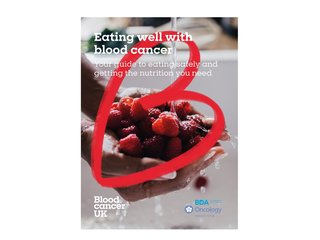Eating safely with neutropenia
What you need to know:
- Neutropenia weakens your immune system, so you can get infections more easily from your food.
- Good food hygiene and avoiding high risk foods can reduce your risk of infection.
A balanced diet
You can still eat a balanced diet with a wide range of foods while you’re neutropenic. Eating well will give you the energy you need to help you through treatment and support your recovery.
This page gives the most up-to-date, evidence-based advice, for eating safely while you are neutropenic. We also have more information about eating well when you have blood cancer.

Your guide to eating well
Get your free booklet all about eating well with blood cancer. Includes information on having a balanced diet, food safety and tips to help with eating problems.
Infections from food
Food that’s not stored or cooked safely can be a source of infection (food poisoning). Some foods also have a high chance of carrying harmful bacteria that can make you sick.
Anyone can be affected by food poisoning, but you are more likely to be very unwell with it if you have blood cancer. This is because:
- Blood cancer and its treatment can cause neutropenia. This weakens your immune system, putting you at more risk of getting infections, and making it harder to fight them off.
- Some blood cancer treatments can damage your gut lining, making it easier for harmful bacteria to pass from your food into your bloodstream.
Good food hygiene can make it much less likely to get sick from the food you eat. You may also want to avoid foods that have a higher risk of carrying harmful bacteria.
Avoiding certain foods
”My hospital team asked me to avoid some foods during treatment. Once I understood the reason (to reduce my risk of infections) I didn't mind too much. And I knew it wouldn't be forever.”
Kat, diagnosed with double hit lymphoma in 2012

What foods have a higher risk of infection?
Click on the food types below to see which foods are most likely to contain harmful bacteria. We’ve also included foods in each group that are safer to eat, or ways to prepare them to reduce the risk of infection.
This list is based on guidance published in 2023 by the Haematology Subgroup of the British Dietetic Association. This is a group of specialist dietitians working with people with blood cancer and other blood conditions.
Your hospital team will let you know if you should avoid these foods, and how long for.
Higher risk foods:
- mould-ripened soft cheeses with a white coating on the outside, such as Brie, Camembert and Chèvre (unless cooked until steaming hot)
- soft blue cheeses such as Danish blue, Gorgonzola and Roquefort (unless cooked until steaming hot)
- unpasteurised or "raw" cow’s milk, goat’s milk or sheep’s milk or cream
- any foods made from unpasteurised milk, such as soft goats cheese and unpasteurised ice cream
- probiotic drinks and yoghurts like kefir, Yakult and Actimel.
What to have instead:
- any cheese from the avoid list as long as it's cooked until steaming hot before eating – this kills bacteria and reduces the risk of infection
- all hard pasteurised cheeses such as Cheddar, Edam, Gruyere, Stilton and parmesan
- soft pasteurised cheeses such as cottage cheese, mozzarella, feta, cream cheese, paneer, labneh, ricotta, halloumi, goat's cheese without a white coating on the outside (rind) and processed cheese spreads
- pasteurised milk, cream and ice cream – check the hygiene rating of the shop or van before before having soft ice cream
- plain, natural, fruit, Greek, bio and live yoghurt.
Higher risk foods:
- raw or runny eggs
- home-made foods made with raw eggs, such as home-made mayonnaise, mousse and ice cream.
What to have instead:
- well-cooked eggs
- shop-bought foods made with raw or undercooked eggs such as mayonnaise and ice cream, as these are likely to have been pasteurised to remove germs.
Higher risk foods:
- damaged or bruised fruit and vegetables
- uncooked sprouted seeds.
What to have instead:
- undamaged fruit and vegetables, including raw fruit, vegetables and salads.
- wash fruit and vegetables before eating, including pre-packed salad, even if it says ready washed
- sprouted seeds that have been cooked until they're steaming hot before eating.
Higher risk foods:
- smoked fish such as smoked salmon and trout (unless cooked until steaming hot)
- raw fish, including sushi made with raw fish
- raw shellfish.
What to have instead:
- cooked fish and seafood
- well-cooked shellfish (such as mussels, lobster, crab and prawns)
- sushi made with cooked fish or vegetables.
Higher risk foods:
- raw or undercooked meat and poultry
- unpasteurised pâté, including vegetarian pâté
- cured or smoked meats, such as salami, pepperoni, chorizo and prosciutto (unless cooked until steaming hot).
What to have instead:
- meat that has been well cooked with no trace of pink or blood – be especially careful with poultry, pork, sausages and burgers
- cold, pre-packed meats such as ham and corned beef
- cured or smoked meats that have been cooked until steaming hot
- pasteurised pâté in a jar.
Higher risk foods:
- black pepper, dried herbs and spices bought loose from delis, farm shops or market stalls
- any foods from "refill stations" where people help themselves, for example cereals, nuts and dried fruits.
These are higher risk because they could have been handled by multiple people, so there’s a risk of contamination with germs.
What to have instead:
- pre-packed, sealed packages of black pepper, dried herbs, spices and other foods.
Ask your team what they recommend
”I was basically told to move to a pregnancy diet, to do everything to reduce the risk of infection (no pink meat, raw fish, no or limited takeaways). This will depend on you and the stage you're at, so listen to the advice you are given on diet or ask your team what they recommend.”
Ritesh, diagnosed with Hodgkin lymphoma in 2022

Common questions about eating with neutropenia
These are some questions that people with blood cancer have asked about eating when neutropenic.
You might have heard the term “neutropenic diet". There’s no official definition of a neutropenic diet, but it has often meant avoiding a lot of different foods, and in some cases avoiding raw fruits and vegetables. The diet is sometimes called a clean diet or low bacteria diet.
In recent years, several research studies have found that a neutropenic diet does not reduce infections. It may even be harmful for some people, as it limits the range of foods you can eat, at a time when you may already be struggling to eat well due to the side effects of treatment. This could mean you don’t get enough nutrients.
Because of the lack of evidence to support it, many hospitals have stopped recommending a neutropenic diet. Instead, they encourage patients to eat a varied diet with as few restrictions as possible. Evidence does support avoiding some higher risk foods, but this is much less restrictive than it was in the past.
You do not need to peel fruit and vegetables. It’s safe to eat raw, unpeeled fruit and vegetables, as long as they are washed.
In the past, some neutropenic diet guidance recommended only having fruit and vegetables that were well cooked or peeled. But there’s no strong evidence that this reduces infection. Removing the skin could mean you don’t get important nutrients like fibre or antioxidants.
It’s safe to drink bottled water when you’re neutropenic.
Some older guidance said you should avoid drinking bottled water, but there’s not enough evidence that this reduces infection. Drinking bottled water can be a good way to stay hydrated, especially when you don’t have access to fresh tap water.
Most yoghurts you can buy in shops are safe to eat when you have neutropenia. Yoghurt is made using bacteria, but in most yoghurts the types of bacteria used are safe and do not cause infection. Fruit, Greek, natural, live and bio yoghurts are all safe to eat.
It’s best to avoid yoghurts or yoghurt drinks labelled ‘probiotic’ or ‘kefir’ if you’re neutropenic, unless your doctor or dietitian recommends them. These contain several different types of bacteria and yeasts that are promoted as having health benefits. At the moment there is not enough evidence to say if probiotic products are safe or beneficial for people with a weakened immune system.
You should also avoid home-made yoghurt made with raw milk, as this may contain harmful bacteria that could make you sick.
There’s no need to sterilise cutlery or crockery. Washing them with hot water and washing up liquid, or washing in a dishwasher, will keep them clean and free from germs.
Ask your hospital team about eating out and takeaways. Their advice is likely to vary depending on your level or neutropenia. It’s best to stick to restaurants and takeaways that have high standards of food hygiene. You can check their food hygiene rating on the Food Standards Agency website. 5 is the highest rating and means their hygiene standards have been rated very good.
It’s safest to avoid buffet restaurants and open salad bars, as food may have been sitting out for long periods of time and serving utensils may be handled by lots of people. This increases the risk of infection.
Your hospital team will be able to advise you on how long to follow these guidelines for, as this will vary from person to person. Even if you are no longer neutropenic, you might still need to avoid high risk foods because you might become neutropenic again, or your gut lining may still be damaged.
If you're feeling worried
We know that thinking about food safety can feel worrying, when you’re already going through a lot. Some people like having a list of foods to avoid, but for others it can feel restrictive or make them feel anxious about what they eat.
Everyone is different, so speak to your healthcare team if you have any worries or questions about what you should be eating. They can give you advice based on your individual situation and level of infection risk.
You can also contact our free Support Service with any questions, or just to talk about how you’re feeling. Call free on 0808 2080 888 or email [email protected]
